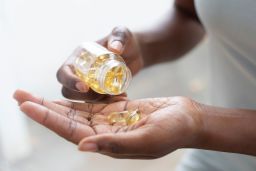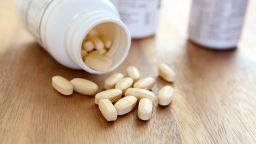Vitamin D supplements aren’t likely to prevent an infection from Covid-19 or respiratory infections like colds or flu, even if your current levels of the vitamin are low, according to two new, large clinical trials.
One study, done in the United Kingdom during the height of the pandemic, gave 3,100 people with insufficient levels of vitamin D a low or a high dose of the vitamin to see if the supplement would prevent a coronavirus or respiratory infection.
Vitamin D supplementation at either dose “did not result in reduced risk of all-cause acute respiratory infections (ARI), or in risk or severity of COVID-19 specifically,” said study author Dr. Adrian Martineau, a professor of respiratory infection and immunity at the Institute of Population Health Sciences at Queen Mary University of London via email.
A second double-blinded, randomized clinical trial, also done during the pandemic, gave over 34,000 Norwegians cod liver oil or a placebo to test the impact of vitamin D on Covid and respiratory disease prevention. Cod liver oil naturally contains low doses of vitamin D, along with vitamin A and omega-3 fatty acids.
The British Medical Journal released both studies Wednesday.
“The major takeaway is that for people in general, a vitamin D supplement did not prevent COVID-19, serious COVID-19 or symptomatic acute respiratory tract infections,” said study author Dr. Arne Søraas, a researcher in the department of microbiology at Oslo University Hospital in Norway, in an email.

Søraas added that the UK study design “complements ours in several ways, with a higher dose of vitamin D given to participants only after measuring their vitamin D status. Nevertheless, their result is supporting our findings and that is the key takeaway too: Neither study found any preventive effect after supplementation with vitamin D.”
The findings of both studies counter a study done in 2020 in Mexico City, where health professionals were given either 4,000 IU of vitamin D a day or a placebo. Researchers found protective effects from the vitamin in just one month. Two more clinical trials that are underway in the United States and Canada will add more data, Martineau said.
The studies were done before vaccinations were widely available, both authors noted. “We can be completely sure that vaccination is way more effective than vitamin D which probably does not prevent COVID-19 at all,” Søraas said.
Vitamin D’s popularity
The primary function of vitamin D is to help the body absorb calcium and phosphate, thus keeping muscles and teeth healthy and bones strong and less likely to break. However, vitamin D is also known to help the immune system fight off invading bacteria and viruses.
Research has shown that vitamin D deficiency impairs the immune system, and some studies have found vitamin D supplements may reduce the risk of respiratory virus infections and calm immune system overreaction.
During the early days of the pandemic, physicians on the front lines began noticing people with lower levels of vitamin D appeared to have a higher risk of dying from Covid-19. Suddenly, the internet was flooded with speculation that taking supplemental doses of vitamin D – even if not needed – would prevent the coronavirus from taking hold.
However, “unlike vitamin C, vitamin D is a fat-soluble vitamin that can ‘build up’ in the system and cause toxicity if taken at very high doses over long periods,” Martineau explained.
Research has suggested that long-term use of higher levels of vitamin D is associated with increases in all-cause mortality, greater risk of cancer, cardiovascular events and more falls and fractures among the elderly.
The recommended daily dose of vitamin D for people in the US between the ages of 1 and 70 is 600 international units (UI) a day, rising to 800 IU a day for those over 70. In the UK, the recommended daily amount is 400 IU a day. Levels in other parts of the world are country-specific to reflect environmental and dietary differences, but typically also range between 400 and 800 IU a day.
Studying people with low vitamin D levels
The UK study was part of COVIDENCE UK, a national study designed to investigate risk factors for developing Covid-19. Researchers enrolled 6,200 adults, age 16 or older, who were not taking vitamin D supplements, and conducted the study between December 2020 and June 2021.
A randomized sample of the participants were given a vitamin D blood test and 3,100 people were found to have low vitamin D levels. The other 3,100 people were assigned to be controls.
The study participants with low levels of vitamin D were then randomized into two groups of 1,550 people who were assigned to take either 3,200 IU or 800 IU of a vitamin D supplement each day for six months. However, the study was not blinded or placebo controlled: Each person knew they were taking a supplement provided by two pharmaceutical companies that supported the study.
During the six months of the trial, neither the high nor low dose of vitamin D had any effect on preventing respiratory tract infections or confirmed Covid-19 cases when compared with the control group, according to the study.
The results contradict two previous meta-analyses of randomized clinical trials conducted by Martineau and his colleagues that did find a significant, albeit small, protective impact against catching respiratory illnesses.
Using a low dose
The Norwegian study, conducted between November 2020 and June 2021, divided 34,601 people between the ages of 18 and 75 into two groups. Each group took either 1 teaspoon (5 milliliters) of cod liver oil or 1 teaspoon of corn oil, which served as a placebo, each day for six months over the winter.
Each teaspoon of cod liver oil contained approximately 400 IU (10 micrograms) of vitamin D, Søraas said. Cod liver oil is a staple in Norway, used for centuries to add vitamin D and omega-3 fatty acids to the Norwegian diet. However, 75.5% of the people in the study were not using vitamin D supplements before enrollment.
Unlike the study from the UK, where many people were vitamin D deficient, testing in Norway showed 90% of people in the cod liver oil group and 72% of those in the placebo group had adequate levels at the start of the study: “But we did not find that this measure influenced the chance of getting COVID-19 or other acute respiratory infections,” Søraas said.
However, just like the UK study, the Norwegian study found vitamin D in cod liver oil had no preventive impact on respiratory infections or confirmed cases of Covid-19.
“The overall message is consistent – two differently-designed studies investigating related interventions in slightly different populations – but the same bottom line – no effect seen,” UK study author Martineau said.
Get CNN Health's weekly newsletter
Sign up here to get The Results Are In with Dr. Sanjay Gupta every Tuesday from the CNN Health team.
“As a medical doctor I see much speculation that very high doses of vitamin D could have beneficial effects for a range of different diseases, but I would encourage everybody to follow science-based government recommendations for all nutrients,” Søraas said.
“Our results support existing recommendations which do not include massive doses.”














